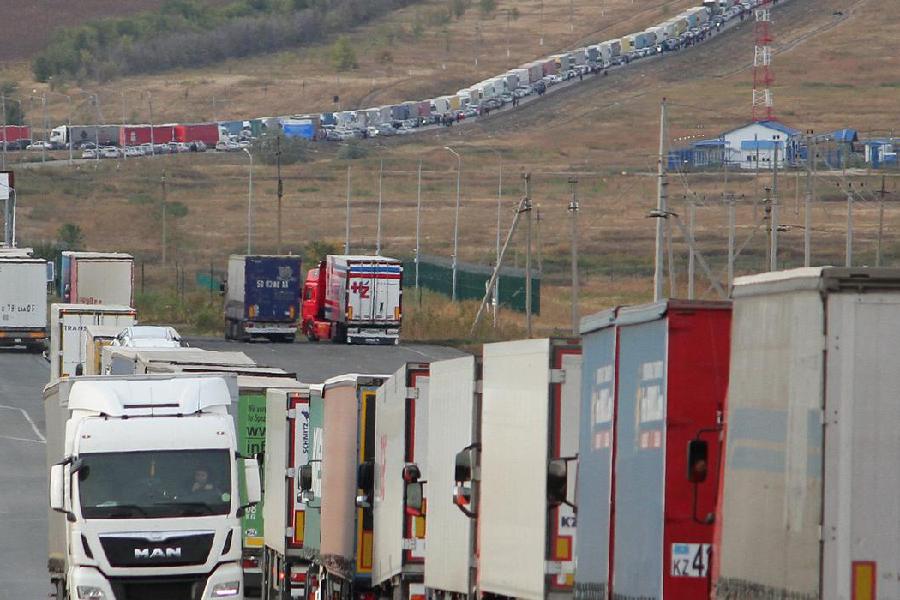The sanctions against Russia mean good business for people and companies in neighboring Kazakhstan. Despite pressure from the US, small traders continue to bring sanctioned goods across the border.
A new Kazakh online system is set to monitor the import and export of goods manufactured abroad. There is speculation that some Kazakh companies are re-exporting goods to Russia that fall under Western sanctions imposed on Moscow.
The Kazakh Ak Zhol (Light Path) party's parliamentary faction recently called on the government in Astana to identify and name companies that might be involved in circumventing sanctions against Russia.
"International partners have doubts about the 22-fold increase in the volume of electronics exports from Kazakhstan to Russia," reads the Kazakh MPs' inquiry. "They attribute this to covert re-exports of sanctioned products from third countries in the course of so-called parallel imports, and also to a counterfeit transit, where goods from Europe do not even enter our country, but are resold halfway to end customers, which disguise Russian companies."
The outcome of a visit by a US-British delegation to the countries of Central Asia led by Assistant Secretary for Terrorist Financing and Financial Crimes Elizabeth Rosenberg and Assistant Secretary for Export Enforcement Matthew Axelrod prompted the questions addressed to Kazakh Prime Minister Alichan Smailov.
Rosenberg and Axelrod said at an April 25 press conference in the Kazakh capital of Astana that they made clear to Kazakhstan and other Central Asian countries that secondary sanctions could be imposed for violations of export controls and US laws.
"We are not talking about iPhones or washing machines. We are talking about specific items of computer technology used to power and navigate missiles and drones used by the Russian military machine to kill civilians and soldiers on Ukrainian soil," Axelrod said, making it clear that "the supply of such items to Russia through Kazakhstan is in direct violation of export controls."
35-year-old Andrei, who lived in Novosibirsk for 10 years, returned to his eastern Kazakh hometown of Ust-Kamenogorsk after the announcement of partial mobilization in Russia in September 2022. In the media, he heard about the US-British delegation's visit and the new online monitoring system for imports and exports — but is doubtful that "American threats and restrictive measures" can somehow influence trade with Russia.
"How to close the 7,500-kilometer border between Kazakhstan and Russia? It's impossible! In eastern Kazakhstan alone, thousands of people live from trade with the Russian constituent republic of Altai, and there are as many small traders these days once again as there were in the 90s," says Andrei K., who lives in eastern Kazakhstan. "They bring cheaper food and take with them all kinds of equipment that is now urgently needed there." He says he uses his battered Lada to transport "special orders" to the Russian city of Barnaul on weekends.
It's a two-hour drive, just over 130 kilometers, from Ust-Kamenogorsk to the Russian border, and another four hours to Barnaul, he says, adding that the road is good and the Russian border officials don't pose a problem "especially if you are carrying electronics or spare parts for cars." He is pleased that the brisk trade with Russia gives him some extra income.
Sabit, who runs an electronics store with a workshop in the center of Ust-Kamenogorsk, confirms that "specific goods" are in great demand in Russia. About six months after Russia's war of aggression against Ukraine began, he says, inquiries from Russia started to increase.
"At first, they were interested in motherboards and memory for computers, graphics cards and other hardware, now they want drones and action cameras," he says. "Chinese Mavic and Agras drones are in demand, and when it comes to cameras, they want Xiaomi," he adds.
Like Andrei, Sabit and his employees often drive the goods to Russia. He is aware that the electronics are dual-use products that are subject to sanctions by the West, so he carefully considers the route he takes to Russia.
"Reports about the online monitoring system initially scared big companies that use large trucks to transport goods to Russia. They can't avoid the border controls. We small entrepreneurs have it easier," says Sabit.
He has a small car, so he can take country roads, drive through forests and across mountains, for instance through the Pavlodar region, which he says is a real loophole. "It's business!" the trader argues."It's good business for many people, considering that in eastern Kazakhstan incomes are much lower than in Astana or Almaty."
The "good deals" have a downside, however. Everyone DW spoke to says almost all goods currently in high demand in Russia have become significantly more expensive in Kazakhstan.
A year ago a quadrocopter manufactured in China "for use in agriculture" cost 600,000 tenge (about € 1,324 or $1,440); the price has gone up to 1.4 million tenge (about € 2,857 euros). Components for computers, laptops, household and office appliances are also significantly more expensive.
"But this price increase doesn't seem to bother our customers in Russia, demand from there has not decreased. On the one hand, that's good, but on the other hand, you also notice that locals are buying less, which is bad," says Andrei.
That's not all, he says. "In eastern Kazakhstan, many people support Russia," says Andrei. "You just have to look at the 'singing fountain' in the center of Ust-Kamenogorsk. It regularly 'dances' to the Russian song 'Kalinka-Malinka'."
Should the West impose secondary sanctions on Kazakhstan, the number of Russia supporters in the Pavlodar region and northern Kazakhstan is likely to increase, says Andrei.











